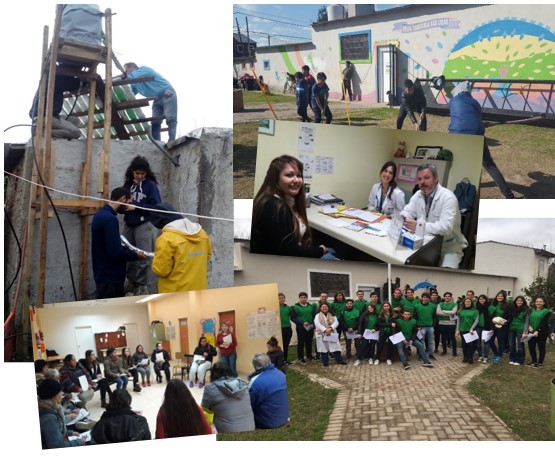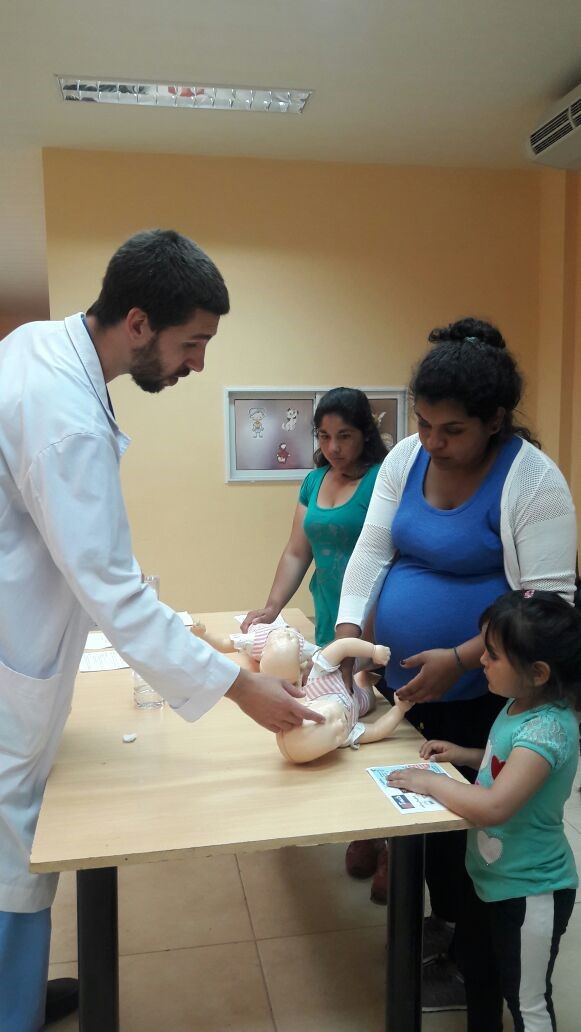Summary
The Word Health Organization (WHO) declared health for all as a universal right, but this goal has not been accomplished in many countries, yet.1 In Argentina, one-third of its population faces difficulties in accessing health care due to different obstacles mainly socioeconomic and cultural. Thus, the number of people that effectively have access to medical care in a qualified center is low.
In 1998 in the City of Pilar (40 kilometers from Buenos Aires, the capital city of Argentina), the Faculty of Biomedical Sciences of the Austral University started its courses, and in 2000 the Austral University Hospital opened its doors. Official data of a census at Pilar, showed an elevated proportion of the community living in underserved areas, in overcrowded settlements without drinking water or adequate sewage. It is a place with high levels of poverty, inequity, and social fragility.
The mission of this educational institution is to serve the community by developing the society by focusing on each individual. The Posta Sanitaria Las Lilas (La Posta) emerges in 2007 as a project of the Faculty of Biomedical Sciences with the purpose of improving each person and society’s health by fostering qualitative changes in attitudes and people´s habits in relation to every aspect of health. This center is located two kilometers from the medical school and takes care of a population of 25,000 residents who live in social and economic vulnerability.
 Resume of activities from La Posta.
Resume of activities from La Posta.
The Posta: An Innovative Project
1. A Project mirrors the social accountability model of the University. It has emerged from its institutional mission and emphasizes the need of caring for each person not only paying attention to health care, but to psychological and contextual basic needs too. The patients at La Posta feel they are taken care of beyond just the disease-oriented point of view.
2. The focus is on each person as the main actor of their own development and promoting the use of their own resources to improve their health.
3. It is based on a model described as education with the community, different from community-oriented education or community-based education. The meaning of the word community is contextual and holistic and includes patients and their families, everyone there, graduate and postgraduate students and faculty members, and different companies and NGOs that contribute to the success of this model. So, this project involves all the educational community, the university stakeholders, and the families of the neighborhood of La Posta.
4. A service project that integrates teaching, research, and patient care. La Posta functions as a bridge between the society and the University. La Posta is a two-way path. Scientific knowledge, social work, and field experiences merge there. For instance, students get to understand how physical health is influenced by social determinants such as educational level; besides, they participate in research of cognitive functions and school learning capacity in malnourished children who attend la Posta. The faculty can easily identify powerful learning experiences such as knowledge related to primary health care or meaningful situations that were not planned. The Posta is a place of significant learning. It not only teaches but is a place where learning takes place, too. Everything that happens at la Posta is considered a learning opportunity for all.

Medical student during a practice in La Posta.
5. The main activities at la Posta are oriented towards key dimensions for each person and the community:
- Health program that includes internal medicine, obstetrics and gynecology, nursing, dermatology, ophthalmology (adults and pediatric), general surgery, family medicine, cardiology, imaging diagnosis, and social work.
- The program of community education that trains both the individual and the community in topics such as nutrition, hygiene, first aid, prevalent health problems, school support, recreation, recycling, and environmental care.
- Community preceptors that disseminate, inform, and promote health habits. These preceptors become a powerful bridge between the community and the health team.
- Patients that teach other community members different topics as part of their therapeutic process: how to prevent violence, health nutrition, self-care. These are instances of active participation where the members of the community change their previous role in the community and empower their peers. They are community members committed to sharing their experiences to help their neighbors.
6. The health problems are faced in an interdisciplinary way: physicians of different specialties, nurses, psychologists, social workers, students of other schools work together, analyze local society problems from different perspectives and consider many multiple variables. Many strategies are used to identify existing problems and they are adapted to each situation: health care in the clinics, surveys to patient´s, in depth interviews at la Posta and at each patient home. Everybody participates in this follow up and problem-solving activity: secretarial staff, nurses, residents, psychologists, social workers, students, and physicians.
7. There is a network of varied organizations that cooperates with la Posta that help to promote the welfare of the community. For instance, a company of massive consumption finances some of the activities, volunteers of another NGO work with young people from 18 to 25 years of age that neither work nor study to help them elaborate on projects that enable them to restart their studies or find a job. Another foundation builds solar panels with recycled materials that bring hot water to the houses in the community.
The Impact and Results of the Project
1. It is the only primary care center member of the health net of the municipality managed completely by a private university.
2. The bonds with the community are wide, dynamic, and deep, and there is evidence of the results such as the experiences and lessons learned for those who participate in the project.
- Some of the results in 2017 are: 15 specialties (medical and health related professions):
- 1,700 beneficiary families;
- 36,500 outpatient consultations;
- 170 health education workshops;
- 2,981 trained community people;
- 200 undergraduate students helped at la Posta;
- 30 faculty members conduct curricular activities;
- 90 children between six and 12 years of age attended school support;
- 20 students volunteered in the school support course;
- 25 physicians in training (residents) see patients at La Posta;
- 10 staff members supervise health related activities at La Posta;
- 14 community members have been trained as health promoters;
- Three previous patients oversee different workshops for the community; and
- Two teachers oversee recreational activities and sports with 50 children from the community.
The real impact on patients was evaluated in 20152 showing that care was effective because of accessibility, continuity of care, holistic care, and mainly for the humanly approach to the patients. Patients valued being treated with dignity, and this is a central dimension of health care.
Finally, La Posta is a project that is part of the University's agenda; it is constantly re-evaluated, with an ambitious and challenging objective, and is aimed at transforming or changing lives of people within this community. Its scope is broad and long-term, since it includes all the members of the educational community and families that live in the nearby neighborhoods.
It is a project that has been sustained for more than 10 years, its growth and impact show that social commitment is more than solidarity or solving unmet needs, it requires thinking about people at all their dimensions and understanding that meaningful and formative learning also happens outside the classroom.
Works Cited
1 Primary Health Care, World Health Organization 1978, Online. Available from: http://www.who.int/topics/primary_health_care/es/
2 Brunelli, María Victoria et al., Evaluation of health interventions in La Posta Sanitaria, unpublished, Dic. 2015.


